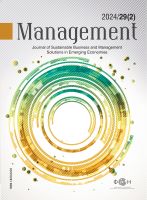Using Earned Value Management for More Sustainable Project Schedule Control
Using Earned Value Management for More Sustainable Project Schedule Control
Author(s): Goran AvlijašSubject(s): Economy, Business Economy / Management
Published by: Fakultet organizacionih nauka Univerziteta u Beogradu (FON)
Keywords: earned value; project duration forecasting; earned schedule; earned duration
Summary/Abstract: Research Question: The aim of this paper is to provide a state-of-science review and offer a critical analysis of contemporary schedule related Earned Value Management (EVM) approaches. Motivation: Since the introduction of the EVM as a tool for project control in the late 1960s, academics have tried to improve its best application. Although this method significantly contributed to efficient cost management, application of EVM to schedule management was falling behind. A significant effort has been made to improve its usability for project time management, which resulted in a dramatic evolution. The paper builds on existing literature and earlier studies, adding value with the inclusion of the cost-based and time-based approaches for assessing project schedule performance. Idea: The idea of this paper was to evaluate some of the most significant EVM schedule control methods and identify open issues. The main study hypothesis is that the most recent approaches provide a more reliable forecast and thus a solid ground for further improvements. Data: A case study in the form of a simplified project was used to illustrate how different contemporary approaches compare in terms of conceptualization, methodological issues, and theoretical underpinnings. Tools: A combination of statistical analysis and Monte Carlo simulation was used to evaluate the performance of different EVM approaches. Microsoft Excel was used for data processing, Microsoft Project and SATA software for data visualization, and Oracle Crystal Ball for Monte Carlo simulation. Findings: Quantitative analysis confirmed that the project-specific Earned Duration Management (EDM) and Earned Schedule (ES) approaches provide sustainable and more accurate results during the whole projects lifespan, while forecasts obtained by more traditional methods proved to be unreliable in the later stages of the project. While practical application generally lags after the growing theory, the latest literature paves the way to the integration of EVM and risk management making the contemporary EVM approaches stochastic and therefore more realistic. Contribution: The results of this study can be used as a basis for introducing advanced and generally more usable EVM models, which will improve the project schedule control.
Journal: Management: Journal of Sustainable Business and Management Solutions in Emerging Economies
- Issue Year: 29/2024
- Issue No: 2
- Page Range: 1-12
- Page Count: 12
- Language: English

